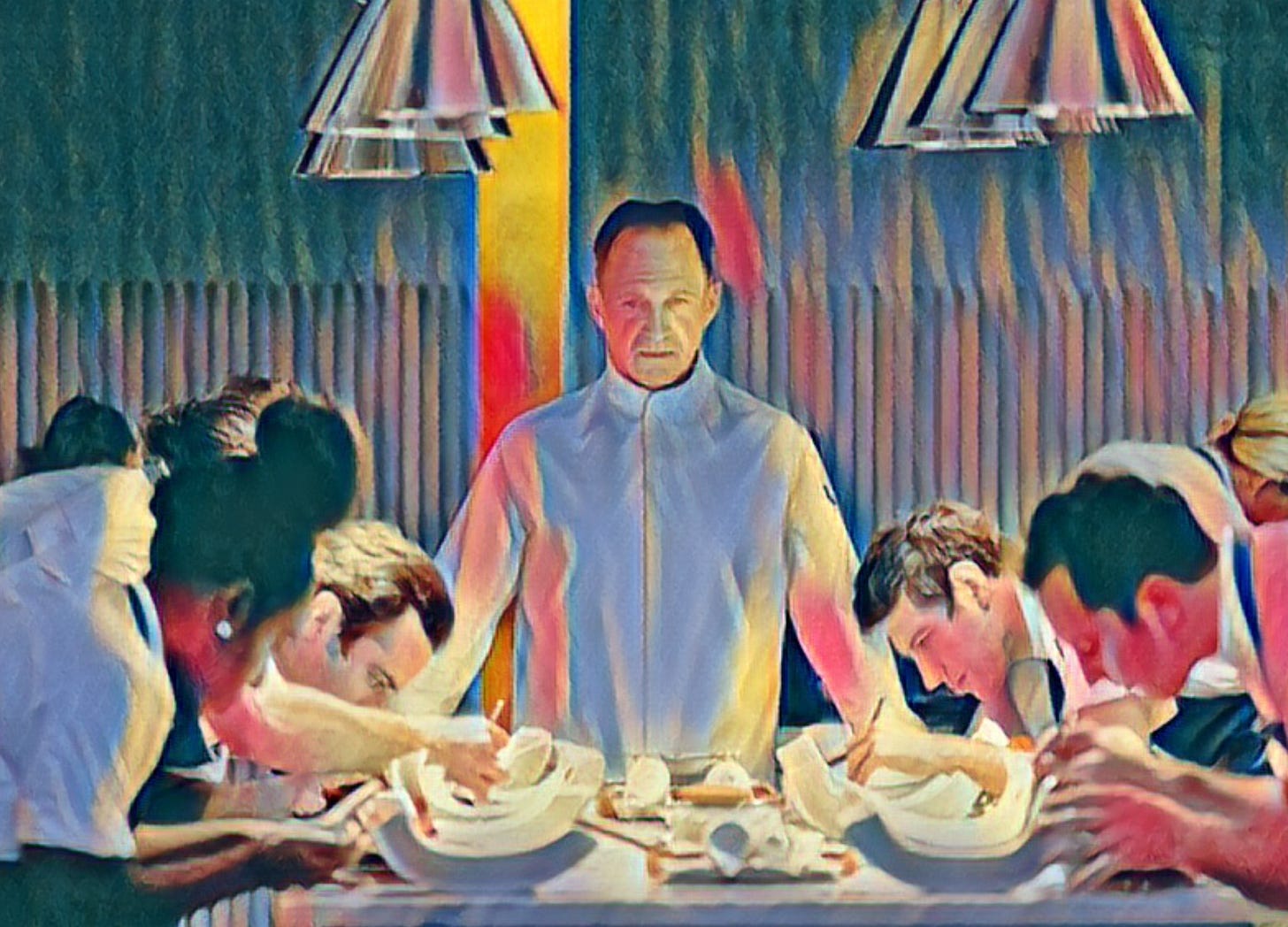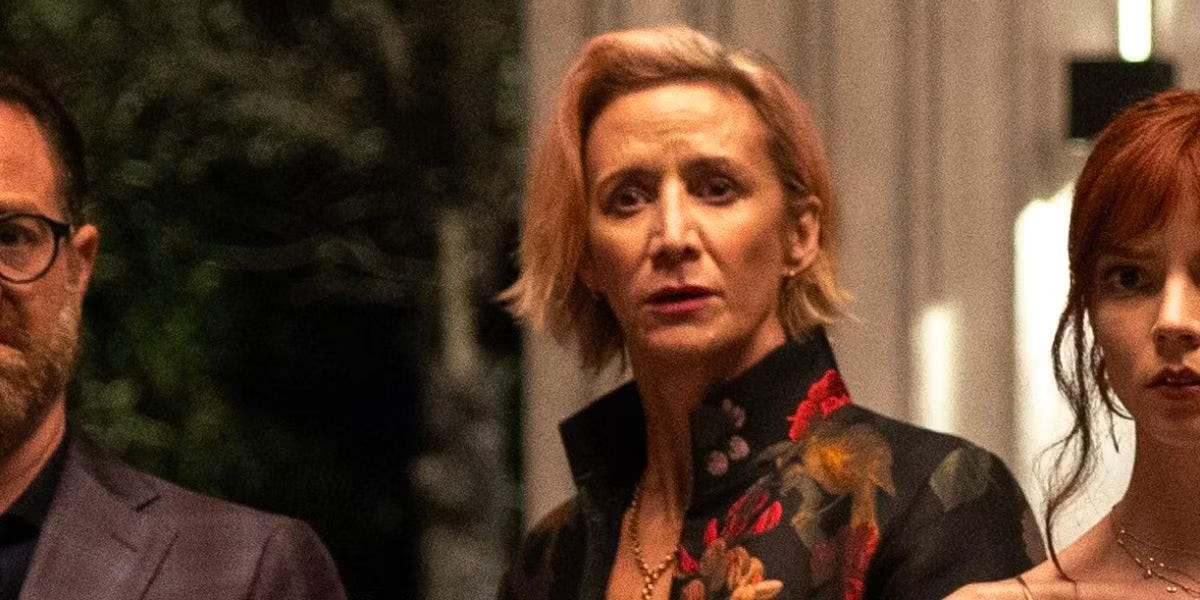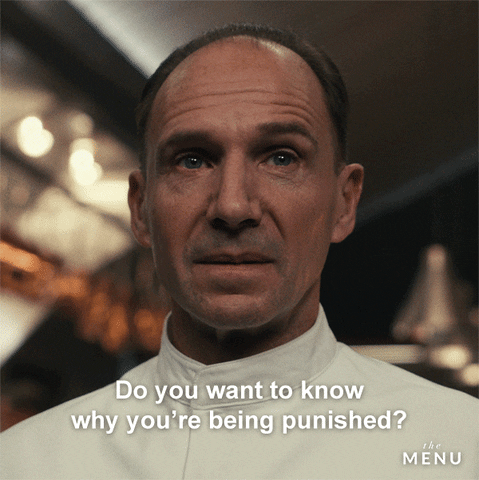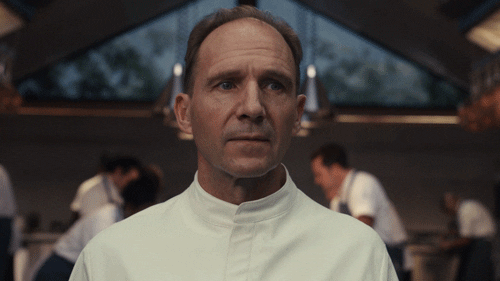(This text has spoilers for the movie The Menu)
Mainstream horror movies - especially lately after the success of Get Out - all seem to have a kind of hidden morale behind them. Horror movies that are an analogy for social malaise are in, and movies with random ghosts chasing people for no reason are out.
I don't mind that. I am actually not a horror movie fan, especially the ones with jump scares. And I do like to find an analogy or metaphor behind the surface of another story. However, The Menu didn't succeed in being the analogy they hoped it would be, or at least, it gives off some weird vibes and leaves some strange subtexts.
*
It all starts peacefully. We follow this couple around on what seems to be a date between Margot (Anya Taylor-Joy) and Tyler (Nicholas Hoult) to a fancy restaurant set on an island. It's an exclusive experience where only 12 people will eat dinner prepared by Chef Slowik (Ralph Fiennes) paying over 1200 dollars each. All the food is locally sourced and cooked on-site by the workers. The menus are never the same, always varying on each occasion.
They start eating the course and hearing explanations from the chef for each dish. In the second dish, the sue chef kills himself in front of everyone as Slowik tells him he will never be good enough or as good as him. After this first shock, they discover that all of them will die there, including the chef himself and the crew. As the chef's Magnus opus, it's all set to be perfect.
As the story unfolds, we understand why each person who is there will die.
In general, they all undermine the chef's art.
Who will die and why?
Money-hungry investment bros launder their profits away from the restaurant and their boss' business. They are taking money from the restaurant that could be used there.
The owner of the restaurant is an angel investor in the restaurant who also doesn't care at all about the food there. He only cares that it makes him look cool to have a fancy restaurant. (He dies dressed as an angel 🙄).
An egocentric food critic who finds small mistakes to judge the quality of food. Her past criticism paved the way for Slowik's career but destroyed many others. She only cares about power. She is accompanied by another critic.
There is an older couple that has dined at the restaurant many times but only for the prestige rather than the food. They cannot remember any dishes and couldn't care less about what is served and how laborious it is to make it.
A foodie (Tyler, Margot's date) who believes that he understands food and how it is made, but in reality, only wants to appear more knowledgeable and better than others for it.
And lastly, a movie star with a declining career who wants to have a food show on television but doesn't really appreciate the food he is eating. He is dining with his assistant who went there to quit her job.
The chef claims that they are all there for their own interests, which they are. They don't appreciate the effort put in by the chef and the crew to make the exquisite menu. In a sense, this is a criticism of all relations between artists and the ecosystems around them.
The chef is an artist, striving to create what he loves. He wanted to be the best at it, regardless of personal costs. But he cannot find joy in it anymore, because those he serves are always taking from him. Dinners are only there for status or to get something for themselves.
A lack of appreciation caused the chef to become jaded, which led to his suicidal act.
The outsider
There's just one problem: Margot wasn't supposed to be there. She was just an escort hired to come with her date Tyler, replacing the girlfriend who just broke up with him. As a result, the chef feels sorry for her and regards her more as a "server" as he and his workers rather than a "taker" like the other guests destined to perish that day.
She is not rich and comes from a rural town. She doesn't belong there.
With her emotional intelligence, she quickly understands why the chef is upset. He lost his love of cooking. She manages to outsmart him, by making him reconnect with "real food”, a burger, and manages to escape in the end.
The movie ends with Margot finishing eating her burger while watching the restaurant burn from afar on a boat. It's somewhat satisfying to see her escape because Tyler hired her to accompany him, even though he knew they would all die there. On the other hand, the movie didn't feel satisfying at all to me.
While I watched this last scene I began to think: what the hell did the writers and producers of the film want to say with this movie? So, let's go over what I didn't find so tasty.
The dinners
At first sight, it seems simple. The people listed above have crossed the chef in some way. They belittled his art and made him feel like cooking wasn't worth it anymore. But why do we feel kind of OK with this explanation and kind of accept everyone there will die?
Firstly, because the moment the movie turns into a horror/thriller, we already expect most of the characters to die. It's a trope. Second, in a way, we are also OK with it because they are all very wealthy. In the wave of “anti-rich” movies and TV shows we see lately, it makes sense. They embezzle and launder money, they are mostly annoying and out of touch, and they can pay for this expansive and frivolous experience. But as the movie continues, it starts giving some random reasons why we should be fine with these people dying and only root for our protagonist Margot.
The most unappealing reasoning of all is the actor's assistant. After all, she is also a worker. She's just an assistant. The chef proceeds to tell her she will die because she studied at an Ivy League university without a loan (?). It later reveals that she has been stealing from her boss, so we feel less worried about her dying. However, she doesn't fit that well into the narrative. She is not directly belittling the chef's art nor is she taking money from the restaurant or anything like that.
But most of all, why on earth would the workers in the restaurant die?
The workers
One could argue that in a scenario where the movie is about the commodification of art, the workers also want to die because they don't see any way out of it. They don't see themselves ever being as good as Slowik and don't get the point of working so diligently to be unhappy like him. But honestly, I don't buy it. Mainly because it's not addressed at any moment in the movie, other than the sue chef's suicide. For me, the workers were the main reason why this movie did not make sense.
All workers act the same and are incredibly obedient. They work from 6 AM to 2 AM and live together in a common room on the island. A boring beige room. They have no agency and follow all orders from the chef. They follow a charismatic leader, drunk with power leading the people to their own demise. They blindly obey and work themselves to death. Literally. Does this sound familiar?
Then one might claim that the chef is acting like a dictator. This means that the workers are only happy with the plan to kill themselves because they have been brainwashed somehow. But again, the movie offers very few (to none) clues in that sense.
The cooks are given virtually zero to no agency or dialogue. Why would they want to kill themselves and those people? Even if they agreed with the reasoning for killing them, in a real-world situation there would be dissent about wanting to die, right?
Also, Slowik at some point asks Margot if she wants to die as a "server” with them or a "taker” but in the end, they all die burned together, so what's the point? Was there really a difference?
In my opinion, this movie is either anti-rich or about people who cannot understand art and who only want to make money from artists. In either of the scenarios, it doesn't provide a satisfactory resolution for the cooks. Why kill themselves if they wanted to prove that they were better than those people or change something?
They are taking the restaurant, killing the rich people, and getting what they want but with destructive and suicidal intent. It's not based on wanting to build anything better, only to destroy. Even more disturbing, the workers have no agency in it at all. They only follow orders, like a beehive. They don't fit into the narrative. Only if the conclusion is that workers are so tired of everything that we only want to see the world burn down. There's no other way out.
Art cannot exist in this ecosystem anymore, and neither can we. Is that it? The movie does, however, save someone. So who is the hero here, and what are they trying to say?
Margot
The only survival is Margot and she does it by killing the Maitre d ', being smart, and making the chef connect with his roots as a burger maker. She is a sex worker and comes from humble origins. She is not like the rich dinners, but she is not like the workers either. She follows her own mind.
She hates fancy food and her obnoxious date.
In the end, those fighting against the elites (workers and the chef) turned out to be worse than the elite themselves.
What we are left with is someone who is individualistic and takes the matter into her own hands. She doesn't want to die but doesn't care that much about the rich people there and even less about the workers, even killing one of them (it was self-defense, but still).
She asks for a cheeseburger which is a food that represents a simpler past. She explicitly asked for a normal burger, not a fancy haute cuisine one. And that's what saved her. It made the chef remember why he started cooking, to begin with, and how he connected with people when they ate.
The movie is trying to say that art can only be real if it's focused on striking a connection, not if it's only interested in being refined. Food should nourish and bring back happy memories. It doesn't need to be conceptual. Art loses its meaning if the artist concentrates too much on critics and on those who can finance it.
I kind of get the point the movie was trying to make with this, but I don't think they succeeded. There are better, not-so-destructive analogies out there. They could have workers matter and not be left in the background. Having a hero not so individualistic and ok with seeing everything burn as long as she is not there burning with them. Making refined food even more symbolic of money and power than what was presented.
And also, why can't we have fancy food and burgers? I think there's room for them both to coexist.
In the end, we are left with a confusing story. A bloated analogy full of loopholes and weird "let's burn everything down” vibes. Honestly, I don't get why people are raving about this movie. I don't think the solution for either art or society is to burn everything down or be individualistic and smart. Or even connecting with our roots or a simpler past. I honestly don't care if the heroine is a sex worker or not if she doesn't care about anybody or anything else other than herself.

















This movie reminds me of The Cook, the Thief, His Wife & Her Lover, which I found pretty distasteful (no pun intended):
https://www.imdb.com/title/tt0097108/?ref_=fn_al_tt_1
I’m not much of a horror fan, but my impression is that horror has always been about “social malaise.” Have you seen George Romero’s Night of the Living Dead from 1968 and its sequels? Zombies and social commentary: they go together like red beans and rice.
Also, I believe it’s “sous-chef,” one of those goofy French-isms borrowed into English (probably by sophisticated diners).